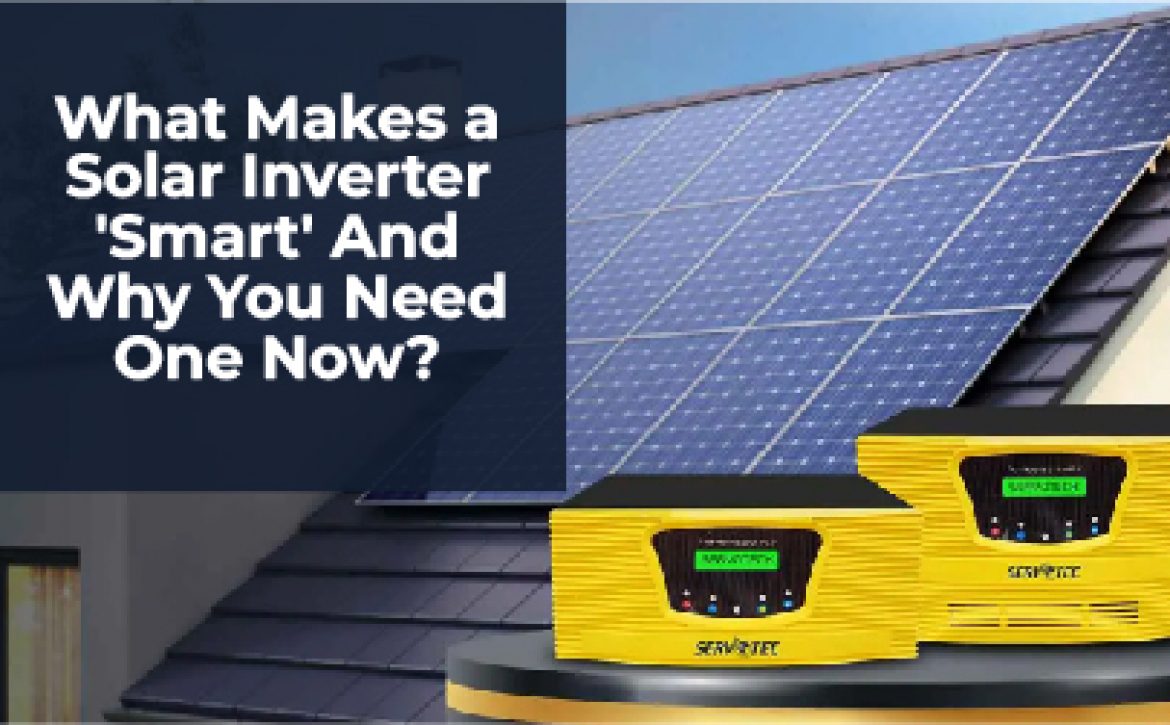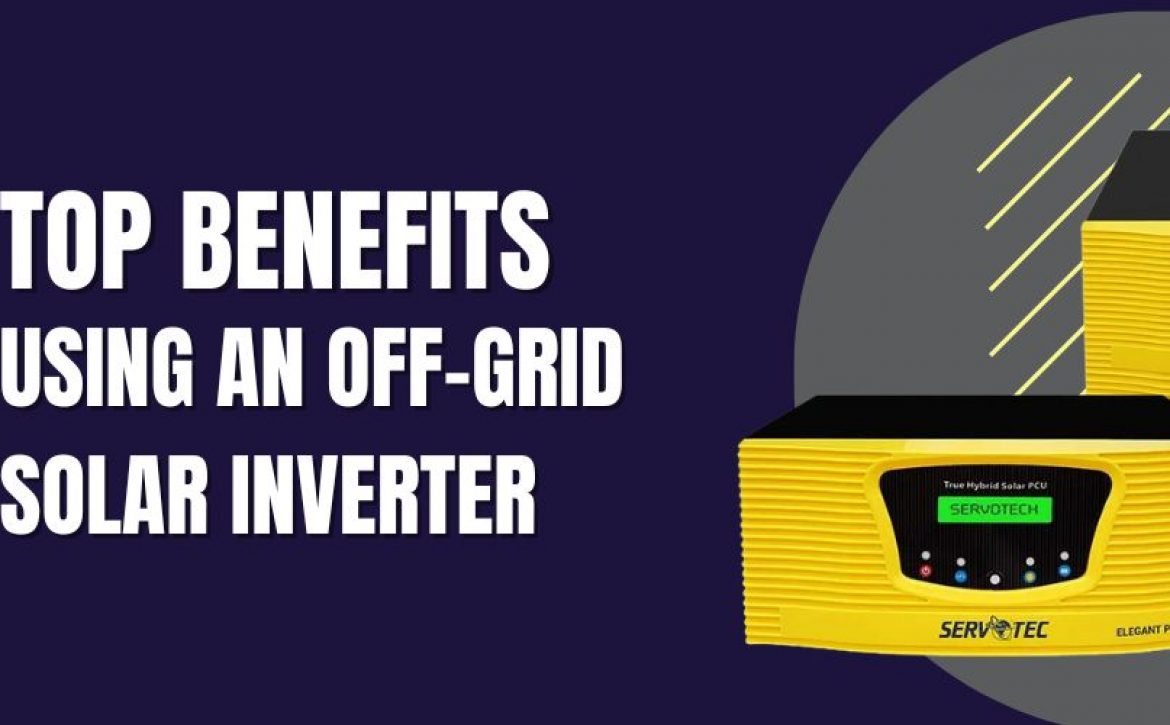What Makes a Solar Inverter ‘Smart’ And Why You Need One Now?
While talking about a solar setup, most people think of Solar Panels; however, a solar inverter is the real brain behind a solar setup. While solar panels convert sunlight into electricity, the setup is only complete with a solar inverter that converts the DC into AC to use and power appliances, homes, workspaces, buildings, and whatnot. Today, Solar Inverters have evolved and become ‘smarter’, offering intelligent control and optimization of power. In this blog, we’ll dive into the smarter aspect of the modern solar inverter and why it’s time we switch to smart solar inverters.
What is a Solar Inverter and How Does it Work?
The solar inverter is a basic yet crucial part of any solar system. It converts DC electricity from the solar panels into AC electricity to power your space. A solar inverter is practically the brain of any solar setup. In its absence, any solar setup is useless. Solar inverters have evolved with time, and today, with the development of smart tech, inverters have become
What Exactly Makes A Solar Inverter ‘Smart’?
A traditional inverter just converts power. A smart inverter, on the other hand, does that and a lot more. Here’s what sets a traditional Solar Inverter apart from a Smart Solar Inverter:
1) Real-Time Monitoring
Smart inverters come with apps and display panels that allow you to monitor power production, consumption, and battery status in real-time, directly from your phone or computer. No more guesswork. You know exactly how much energy you’re generating, using, or feeding into the grid.
2) Grid Interaction
Unlike conventional inverters that shut down during a grid outage, smart solar inverters can communicate with the grid, manage loads, and even support backup power when paired with batteries and a complete solar setup. Some can even send excess power back to the grid in a more regulated and efficient manner, supporting net metering or grid stabilization.
3) Load Management
Smart inverters can prioritize energy flow based on usage. That means you can program it to power your most critical appliances first, store excess energy in batteries, and use the stored energy from batteries at peak hours to multiply your overall savings.
4) Fault Detection & Alerts
Smart inverters come with built-in diagnostic tools capable of instantly detecting faults like underperformance, cable disconnections, panel shading, or any other failures and send alerts so you can fix them before they affect your savings.
5) Integration with Battery Systems (BESS)
If you look at any smart solar inverter company/manufacturer like Servotech Renewable, you’ll notice their smart inverters are designed to work seamlessly with Battery Energy Storage Systems (BESS). This means better energy backup, smarter usage during peak hours, and complete energy independence.
Why Choose A Smart Solar Inverter for Home?
We’re not in the 90s anymore, when inverters were just meant to store power for power outages. With the development of solar systems, the expectations have completely changed, and so have the challenges, from rising electricity costs to unpredictable power cuts and the growing demand for sustainable energy, and a smart solar inverter is the perfect solution to all these challenges.
Here’s why upgrading to a smart inverter is not just a good idea, but a necessity:
1. Make Every Unit Count
A smart inverter ensures maximum efficiency, meaning you get more out of your solar panels. With better data, optimization, and faster diagnostics, you make sure no unit of solar power goes to waste.
2. Be Future-Ready
Whether you want to add EV chargers, home automation, or a battery backup, smart inverters are built for integration. Solar inverters come in all shapes and sizes, serving different purposes. Mainly, there are 3 types of solar inverters: hybrid solar inverters, on-grid solar inverters, and off-grid solar inverters, each meant to serve a different purpose. While choosing a solar inverter, it’s important to choose the right one that lasts long and works seamlessly with your solar setup.
3. Support a Smarter Grid
Smart inverters can respond to utility signals, like adjusting output when the grid is under pressure. That means your system contributes to grid health while you enjoy clean energy.
Common Myths About Smart Solar Inverters
Myth 1: Smart inverters are too expensive.
Reality: The installation cost may be slightly higher, but it’s completely justified when you look at the efficiency gains, maintenance savings, and overall savings one can make with a smart solar inverter.
Myth 2: Old Inverters save just as much energy
Reality: A traditional inverter might be holding your system back. Upgrading to a better one, such as a solar inverter from Servotech, will upgrade your overall system, support batteries, and increase the overall system value.
Myth 3: They’re too complex to use.
Reality: Smart inverters are built for simplicity, so you don’t have to stress. Most offer user-friendly apps and auto-settings that manage everything without manual input.
What to Look for in a Smart Solar Inverter
Not all inverters marketed as “smart” are created equal. Here’s what you should check before investing:
- Remote monitoring via mobile/web
- Battery compatibility (especially with Li-ion/BESS)
- Time-of-use programming
- Real-time alerts and diagnostics
- Modular design for scalability
- Brand reliability and local support
How is Servotech Leading the Smart Solar Inverter Revolution
At Servotech Renewable Power System Ltd., we design and manufacture smart solar inverters that are not just efficient but also customized for India’s unique power needs, from urban rooftops to rural off-grid areas. With Servotech inverter solutions, households, businesses, and even EV charging stations can power their operations intelligently, sustainably, and affordably.
Servotech offers a wide range of Solar Inverters, all of which are mentioned below with their key features:
1. Sparkle Series: Hybrid Solar Inverter
- Range – 2kW to 7.5kW (1 Phase)
- Range – 10kW to 22.5kW (3 Phase)
- Built-in 100A Solar Charger
- Wide MPPT Range 40-500V
- Works with Generator
- Support Lithium/ Lead-acid Battery
- Detachable Dust Cover
- Lithium Battery Activation
- WiFi Monitoring
2. Solvion Series: On-Grid Solar Inverter
- Range Available – 1kW to 100kW
- Load Consumption Monitoring
- IP65 Protection
- Power Export Limit
- Big LCD Display
3. Microsync Series: On-grid Micro Inverter
- Power capacity – 800W and 1600W
- Convenient multi-angle adjustment
- Aluminium alloy bracket
- Wi-Fi connectivity for remote management by phone
- Safe and Simple Installation.
4. Servlith Series: Energy Storage Systems
- Range – 1.2kWh to 15kWh (Domestic User) 5.1kW (E-Rickshaw)
- Suitable for photovoltaic energy storage
- High charge and discharge currents of up to 100A/200A, suitable for solar energy storage systems.
- Ultra-long cycling life
- 5000 battery cycles, with a 5-year warranty and a designed lifespan of over 10 years.
- Equipped with a display screen with communication pofis (CAN/RS485/RS232).
- Wall-mountable design
- Built-in protections against overcharge, over-discharge, over-temperature, over-current, Short-circuit, etc.
- Communication friendly
5. Elegant Plus: Off-Grid Solar Inverter
- Intelligent Modes
- Pure Sine Wave
- True CV CC PWM
- LCD Display
- Advanced DSP Technology
- AI Charge Sharing
6. FLARE: Off-Grid Solar Inverter
- Configurable User Settings
- Pure Sine Wave
- True MPPT
- Remote Monitoring IoT
- Advanced DSP Technology
- Intelligent Modes
- AI Charge Sharing
7. Fusion: Hybrid Solar Inverter
- Bidirectional Inverter: Capable of converting solar energy to usable electricity and managing power from the grid.
- Flexibility in Design: Adaptable to various solar modules and power needs.
- Grid Utilization: Efficiently uses and manages power from both solar panels and the grid as needed.
- Batteryless Operation: Operates seamlessly without a battery bank, enhancing cost-effectiveness.
- IGBT-Based Rectifier: Utilizes Insulated Gate Bipolar Transistor technology for improved efficiency and performance.
- Advanced Multiple DSP: Incorporates advanced Digital Signal Processing for precise control and enhanced system stability.
- Supports Multiple Inputs: Can handle inputs from various renewable sources like solar panels, wind turbines, etc.
- Monitoring Features: Equipped with monitoring capabilities for real-time performance tracking and system health.
Bottomline
The energy needs are increasing with each passing day, grids are strained, and sustainability is no longer optional. A smart solar inverter is your gateway to energy freedom and financial savings. If you’re planning to go solar, or already have, it’s time to power your system with intelligence. Upgrade to Servotech smart solar inverter today, and make your solar investment truly future-ready.









 Get Quote
Get Quote





